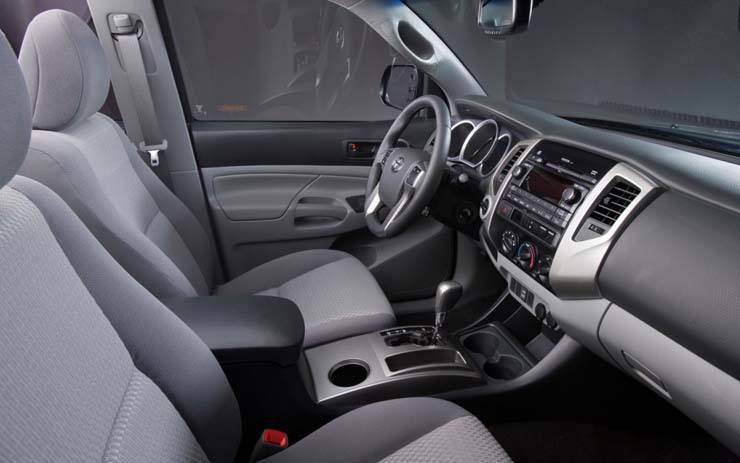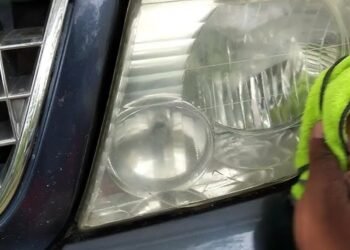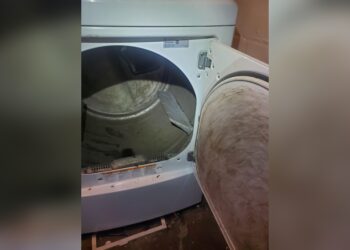Are you frustrated with your Toyota Tacoma’s door locks acting up? If your doors are making strange noises, locking or unlocking inconsistently, or just won’t respond to your key fob, you’re not alone.
Door lock issues in the Toyota Tacoma are common and can be more than just a minor annoyance—they can affect your security and convenience every day. You’ll discover the most common causes behind these problems, how to recognize the warning signs, and what steps you can take to fix them quickly.
Keep reading to regain control over your Tacoma’s locks and drive with confidence again.

Credit: parts.olathetoyota.com
Common Door Lock Problems
Many Toyota Tacoma owners face door lock problems that affect daily use. These issues range from strange noises to electrical faults. Knowing common problems helps identify and fix them faster. Here are some frequent door lock problems found in Toyota Tacomas.
Clicking And Grinding Noises
Clicking or grinding sounds often come from a failing door lock actuator. This small motor controls locking and unlocking. When worn out, it makes unusual noises during operation. Ignoring these sounds can lead to complete lock failure.
Inconsistent Locking Response
Sometimes the door locks work only occasionally. Pressing the key fob or button may not lock or unlock the doors every time. This inconsistency can be caused by weak actuators, damaged wiring, or a faulty control module.
Slow Or Delayed Lock Operation
Delays in locking or unlocking are common signs of actuator issues. The lock may take several seconds to respond after pressing the button. Slow response can also result from low battery voltage or electrical connection problems.
Doors Stuck Locked Or Unlocked
Doors that stay locked or unlocked without responding to controls are a major concern. This problem can trap passengers inside or leave the vehicle unsecured. It often points to a broken actuator or mechanical linkage failure.
Electrical And Alarm Malfunctions
Door lock problems sometimes trigger false alarms or prevent the alarm from activating. Electrical faults in the lock system may cause random lock cycling or failure to arm the security system. Proper diagnosis of wiring and sensors is necessary.
Credit: www.tacomaworld.com
Diagnosing The Issue
Diagnosing door lock issues in a Toyota Tacoma requires a step-by-step approach. Identifying the root cause can save time and money on repairs. This process involves checking electrical components and mechanical parts.
Checking Fuses And Wiring
Start by inspecting the fuses related to the door locks. Locate the fuse box under the dashboard or hood. Use the owner’s manual to find the correct fuse. Remove the fuse and check for any damage. Replace a blown fuse with one of the same rating. Next, examine the wiring harness for frayed or broken wires. Loose connections can cause the door locks to fail.
Testing The Door Lock Actuator
The door lock actuator controls locking and unlocking. Listen for clicking or buzzing sounds when using the lock switch. No sound may indicate a faulty actuator. Remove the door panel to access the actuator. Use a multimeter to check for power at the actuator. If power is present but the actuator does not work, it likely needs replacement.
Inspecting The Microswitch
The microswitch signals the actuator to lock or unlock. It sits inside the door lock assembly. Test the microswitch by pressing it manually and checking for continuity with a multimeter. A broken or stuck microswitch can prevent the door lock from operating. Replace the microswitch if it shows no continuity during testing.
Evaluating The Key Fob Functionality
The key fob sends wireless signals to control the locks. Check the battery inside the key fob and replace it if weak. Test the key fob by locking and unlocking the doors from a short distance. If it does not work, try reprogramming it or use a spare fob. Persistent problems may require professional diagnosis or fob replacement.
Diy Quick Fixes
Experiencing door lock problems with your Toyota Tacoma can be frustrating. Many issues can be fixed at home quickly. These DIY fixes save time and money. Simple steps often restore your door locks to full function. Follow these easy guides to troubleshoot and repair common lock issues.
Cleaning The Actuator Motor
The actuator motor moves the lock mechanism inside the door. Dirt and debris can cause it to stick or fail. Start by removing the door panel carefully. Use a soft brush and compressed air to clean around the motor. Avoid using water or harsh chemicals. After cleaning, test the lock to see if it works smoothly.
Lubricating Lock Mechanisms
Locks dry out over time, making them stiff or noisy. Use a silicone-based lubricant on all moving parts. Spray inside the keyhole, latch, and around the lock rod. Avoid oil-based lubricants, which attract dust. Work the lock back and forth to spread the lubricant evenly. This helps locks move freely and quietly.
Resetting Electrical Components
Electrical glitches can cause power locks to stop working. Disconnect the vehicle battery for about 10 minutes. This action resets the door lock system. Reconnect the battery and test your locks again. This simple reset often fixes temporary electronic faults. If the problem continues, check wiring or consult a professional.
Replacing Blown Fuses
Power door locks rely on fuses to protect the circuit. A blown fuse stops the locks from working. Locate the fuse box inside the cabin or under the hood. Use your owner’s manual to find the door lock fuse. Remove it and check if the metal strip inside is broken. Replace with a fuse of the same rating if needed. Test the locks after replacing the fuse.
When To Replace The Actuator
The door lock actuator is a key part of your Toyota Tacoma’s locking system. It controls the locking and unlocking of the doors. Over time, the actuator may wear out or fail. Knowing when to replace the actuator can save you from bigger problems and keep your truck secure.
Replace the actuator if you notice it is not working properly. Early replacement helps avoid door lock failures and keeps your Tacoma’s doors operating smoothly.
Signs Of Actuator Failure
Listen for strange noises like clicking or buzzing from the door. The locks may move slowly or stop working. Sometimes, doors get stuck locked or unlocked. These are clear signs the actuator may be failing. The door open warning light might stay on. The car alarm may activate randomly.
Sourcing Replacement Parts
Use genuine Toyota parts for the best fit and durability. Check local dealerships or trusted auto parts stores in Austin, Texas. Online retailers offer good options but verify part numbers. Avoid cheap or generic actuators as they wear out faster. Choose parts designed for the Toyota Tacoma model year you own.
Step-by-step Actuator Replacement
First, disconnect the battery to avoid electrical issues. Remove the door panel carefully using a trim tool. Locate the faulty actuator inside the door frame. Unplug the wiring harness connected to the actuator. Unscrew the mounting bolts holding the actuator in place. Remove the old actuator and install the new one. Reattach the wiring and secure the actuator with bolts. Put the door panel back on and tighten all screws. Reconnect the battery and test the door lock function.
Reprogramming Key Fobs
After replacing the actuator, the key fob may need reprogramming. Use your truck’s manual for specific instructions. Usually, press and hold lock and unlock buttons together. Some models require a sequence of ignition key turns. Reprogramming ensures the remote controls work with the new actuator. Test all doors to confirm proper lock and unlock response.
Preventive Maintenance Tips
Preventive maintenance plays a key role in avoiding Toyota Tacoma door lock issues. Small, regular care keeps locks working smoothly. It prevents costly repairs and ensures your vehicle stays secure. Follow these simple tips to protect your door locks and enjoy hassle-free use.
Regular Lubrication Schedule
Lubricate door locks every six months. Use a silicone-based spray or graphite powder. Avoid oil-based lubricants that attract dirt. Apply lubricant inside the keyhole and around the locking mechanism. This reduces friction and prevents parts from sticking or wearing out.
Protecting Electrical Components
Check wiring and connectors for damage. Keep electrical parts clean and dry. Use dielectric grease on connectors to prevent corrosion. Avoid pulling on wires when working near door locks. Proper care of electrical components ensures power locks function correctly.
Avoiding Moisture Damage
Seal door edges and weatherstripping to block water entry. Dry wet areas quickly after rain or washing. Moisture inside door panels can cause rust and electrical shorts. Use moisture absorbers in humid climates to reduce dampness near door locks.
Routine Lock Function Checks
Test door locks weekly for smooth operation. Lock and unlock all doors using the key, remote, and inside switch. Listen for unusual sounds or delays. Early detection of problems allows timely fixes. Keep locks reliable with simple, regular checks.
Credit: www.tacomaworld.com
Legal And Recall Information
Legal and recall information is important for Toyota Tacoma owners facing door lock issues. Understanding your rights and available remedies can help protect your vehicle and safety. This section covers key legal actions, how to check recalls, and steps to file complaints or claims.
Toyota Door Lock Actuator Lawsuit
Many Toyota Tacoma owners have reported door lock actuator failures. This part controls the locking and unlocking of doors. A defective actuator can cause locks to stop working or behave erratically. Some owners joined lawsuits claiming Toyota knew about these defects but did not fix them promptly. These lawsuits seek compensation for repair costs and inconvenience. Staying informed about ongoing legal cases helps you know your options.
Checking For Recalls
Toyota may issue recalls for door lock problems affecting safety. Recalls mean Toyota will repair or replace faulty parts at no cost. Owners can check for recalls by entering their vehicle identification number (VIN) on the National Highway Traffic Safety Administration (NHTSA) website or Toyota’s official site. Regularly checking recalls ensures you do not miss important safety updates. Addressing recalls quickly prevents further damage or safety risks.
Filing A Complaint Or Claim
If your Toyota Tacoma’s door locks fail and no recall exists, you can file a complaint. The NHTSA accepts safety complaints related to vehicle defects. This action helps regulators track common problems and may lead to future recalls. You can also file claims through your dealership or Toyota customer service for warranty repairs. Keeping detailed records of issues and repairs strengthens your claim. Acting early may save money and protect your vehicle’s security.
Frequently Asked Questions
What Is The Toyota Door Lock Defect Lawsuit?
The Toyota door lock defect lawsuit addresses faulty door lock actuators causing locking failures, noises, and safety issues. Plaintiffs seek compensation for repairs and damages.
Why Is My Toyota Power Door Lock Not Working?
Your Toyota power door lock may fail due to a blown fuse, faulty door lock actuator, or damaged wiring. Check the fuse box and inspect the actuator motor and wiring for issues. Replacing a faulty actuator often resolves the problem.
What Are The Symptoms Of A Bad Door Lock Actuator?
Symptoms of a bad door lock actuator include clicking or grinding noises, slow or inconsistent locking, and doors stuck open or locked. It may also cause the door ajar warning light to stay on and trigger random alarm activations.
Why Did My Door Lock Suddenly Stop Working?
Your door lock may stop working due to a blown fuse, faulty door lock actuator, or wiring issues. Check for unusual noises or slow response. Replace damaged parts promptly to restore function.
Conclusion
Toyota Tacoma door lock issues can disrupt your daily routine and safety. Identifying common signs like strange noises or inconsistent locking helps you act fast. Regular checks on fuses and actuators can prevent bigger problems. Simple fixes often restore proper function without costly repairs.
Staying informed about these issues keeps your Tacoma secure and reliable. Don’t ignore warning signs; early attention saves time and money. Your truck deserves smooth, dependable door locks every day.

















